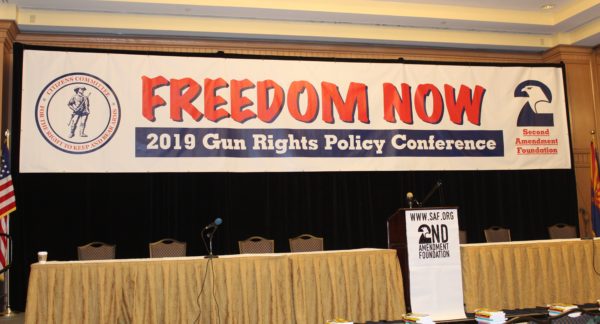
“The war against gun rights has gone nuclear!”
So declared Alan Gottlieb, founder and executive vice president of the Second Amendment Foundation and chairman of the Citizens Committee for the Right to Keep and Bear Arms as he opened the 34th annual Gun Rights Policy Conference in Phoenix over the weekend.
It was, according to a report in the Arizona Republic, the largest GRPC in the event’s history. It is no mystery why attendance was almost standing-room-only as the two-day session opened. With widely-reported problems facing the National Rifle Association and the 2020 elections looming, gun owners are looking for ways to direct their energies. With more than 90 speakers and some two dozen panels, this year’s conference attracted rights activists from all over the country.
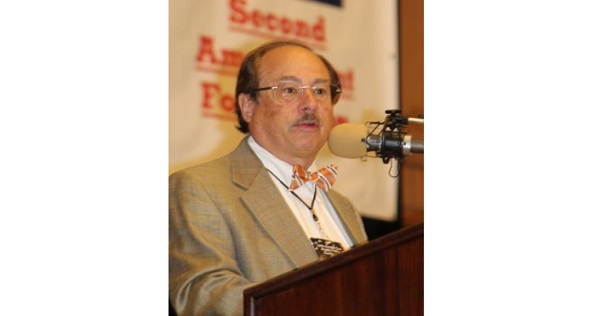
Gottlieb’s opening remarks were aimed at energizing those activists, and they hit the mark.
“A few years ago,” he noted, “we were deplorables. Now we’re considered terrorists.”
He chastised the establishment media for allowing the argument to be essentially one-sided, and he noted that he gun rights movement is “up against billionaires who want to buy our civil rights.”
Still, with so much against gun owners, Gottlieb acknowledged that far-left Democrat presidential candidate “Beto” O’Rourke “did us a great big favor.”
“The Democrat agenda has become extreme,” Gottlieb said, after noting that no other Democrat candidate disagreed with O’Rourke during the last presidential debate when he declared, “Hell, yes, we’re going to take your AR15, your AK47!”
Gottlieb’s opening address was a perfect lead-in to the federal affairs briefing from Mark Barnes, principal at Mark Barnes & Associates, a national and international firearms legal and policy firm.
Barnes predicted that some of the extreme gun control measures already introduced in Congress will not pass. He concurred that Democrat presidential candidates have become “virulent” in their anti-gun approaches, and he referred the audience to a report from the U.S. Secret Service earlier this year on mass shootings.
“It would be well advised,” he said, “for our policy makers in Washington to read the facts.”
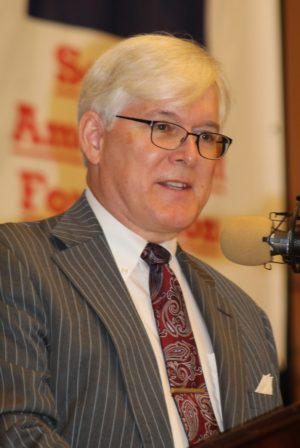
The document, which may be read here, covers but 16 pages, but they are loaded with information. Barnes encouraged the audience to read it.
Barnes was critical of the current “dialogue” now in Washington, D.C. which focuses on firearms and not on preventing mass shootings.
Meanwhile, he alluded to a proposal that surfaced just before the conference convened, that apparently was a product of the Justice Department. It suggests firearms transfers be made through “licensed transfer agents” with some access to the National Instant Background Check System (NICS). Under this scenario, buyer information would not be retained.
‘It’s not a new idea, it’s an old idea,” he said. “Whether it will gain any currency in Washington, D.C., we’ll just have to see.”
‘Elephant in the Room’
The first panel dealt with the controversy surrounding the National Rifle Association. It featured Rob Pincus,
vice president of the Second Amendment Organization and director of media relations for “Save the Second,” a maverick group ostensibly to make the NRA stronger, more effective and relevant.
“We must reform the leadership and the bylaws,” says the group statement at its Facebook page.
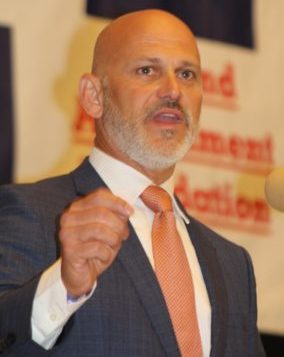
Pincus, who has become somewhat “the face” of NRA member discontent, led the discussion, reminding the audience, “We are the gun lobby, we are the voters, we are the advocates.” He insisted that he wants the NRA to be stronger heading into the election cycle, and that the “voice” of the so-called “gun lobby” is “our voice.” With more than 100 million gun owners in the country, unity is a must, he stressed. He said that unity must come from cooperation and collaboration, not “falling in line.”
“There are hundreds of millions of firearms in America that are used responsibly every day,” he commented.
Pincus was joined on the stage by Jim Irvine, president of the Buckeye Firearms Association (BFA). Noting that everyone hopes things will work out, he reminded the audience that “Hope is not a plan.”
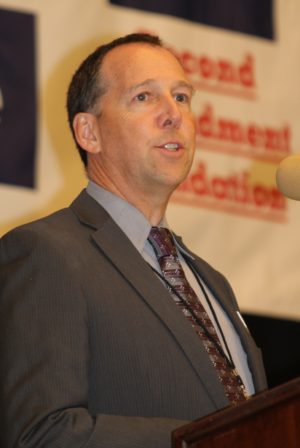
He explained that while no other organization could replace the NRA, other organizations need to “step up to the plate.” That would fall on the shoulders of state organizations such as BFA, which could turn out “an army” of Buckeye gun owners. The strategy would involve working with gun stores and other businesses, and build that army through “targeted (voter) registration.”
It is going to be a monumental challenge, both speakers intimated, but the stakes are too high to not try.
“Failure is not an option,” Irvine said.